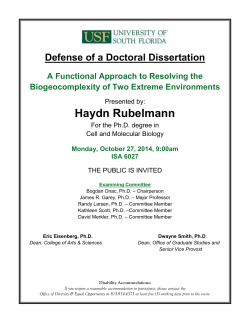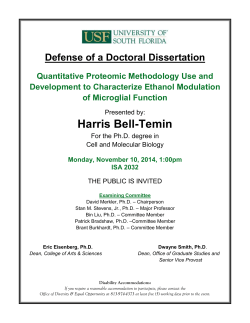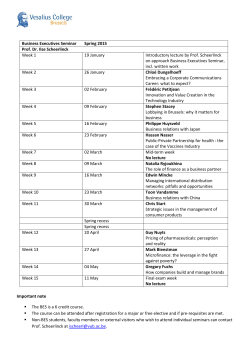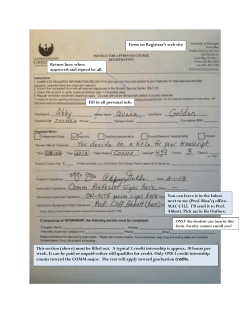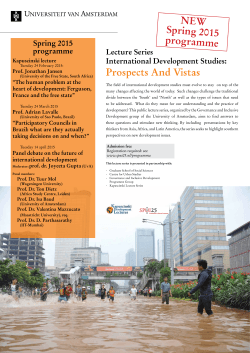
THE UNIVERSITY - Beirut Arab University
THE UNIVERSITY Notice BAU Catalogue encompasses information related to BAU campuses, facilities and services, along with the different faculties and centers at BAU with their undergraduate curricula. This catalogue’s information applies to the academic year 2014-15. BAU reserves the right to make modifications in programs, academic requirements, and teaching staff when needed, without prior notice. Students are held responsible for the information present in this catalogue. Failure to read and abide by BAU’s regulations will not exempt students from consequences. PRESIDENT, ADMINISTRATIVE AND ACADEMIC OFFICERS President and Administrative Officers Prof. Amr Galal Al Adawi, PhD, President Prof. Khaled Hassan Baghdady, PhD, Vice-President for Tripoli Branch Affairs Prof. Essam Osman, PhD, Vice President for Medical Sciences Mr. Issam Houry, Secretary General Deans - Prof. Mayssah Ahmad Mostafa El-Nayyal, Dean / Faculty of Arts - Prof. Mohammad Hasan Kassem, Dean/ Faculty of Law and Political Science - Prof. Nehale Farid Mostafa, Dean / Faculty of Business Administration - Prof. Ahmad Salaheddine Attia, Dean / Faculty of Architectural Engineering - Prof. Adel Ahmad El-Kurdi, Dean / Faculty of Engineering - Prof. Raja Fakhoury, Dean / Faculty of Science - Prof. Abdallah El Lakkany, Dean / Faculty of Pharmacy - Prof. Naglaa Mostafa Mashaal, Dean / Faculty of Medicine - Prof. Issam Mohammad Hasan Osman, Dean / Faculty of Dentistry - Prof. Mostafa Mrad, Dean / Faculty of Health Sciences - Prof. Mohammad Raslan, Dean of Academic Development - Prof. Soubhi Abu Shahine, Dean of Student Affairs - Prof. Hania Nakkash, Dean of Postgraduate Studies and Research Assistant Deans - Dr. Omar Houry, Assistant Dean / Faculty of Law and Political Science - Dr. Abdullah Nassreddine, Assistant Dean / Faculty of Business Administration - Dr. Sawsan Saridar, Assistant Dean / Faculty of Architectural Engineering - Prof. Yehia Temsah, Assistant Dean / Faculty of Engineering - Prof. Ghassan Younes, Assistant Dean / Faculty of Science - Dr. Lama Soubra, Assistant Dean / Faculty of Pharmacy - Dr. Mohammad Houry, Assistant Dean / Faculty of Medicine - Dr. Rola Abiad, Assistant Dean / Faculty of Dentistry - Dr. Rami Abbas, Assistant Dean / Faculty of Health Sciences Faculty Directors - DR. Hani Shaarani, Director / Faculty of Business Administration-Tripoli Branch - Dr. Nabil Mhareb, Director / Faculty of Architectural Engineering- Tripoli Branch - Dr. Ahmad El-Lakkany, Director / Faculty of Engineering - Tripoli Branch - Prof. Mohamad Sherif Al-Jayar, Director / Faculty of Science - Tripoli Branch - Prof. Adel Amara, Director / Faculty of Health Sciences -Tripoli Branch Administrative Directors Mr. Afif Abla, Deputy Secretary General for Administrative Affairs Mr. Mohammad Hammoud, Deputy Secretary General for Students’ Affairs Mr. Amin Houry, Deputy Secretary General for Computer Affairs Mrs. Najat Madhoun, Director of Student Affairs Dr. Walid Shatila, Director of Information Technology Mrs. Zina Mounir Ariss, Director of Public Relations Mr. Selim El Madhoun, Director of Purchase Affairs Mr. Ibrahim El Rashidi, Director of Engineering Affairs Mr. Mohamad Koleilat, Director of Finance Affairs Mrs. Noura Shaaban, Director of Network and Systems Mr. Nabil Khalifeh, Executive Director – President’s Office Mrs. Wafaa Baytamouni, Administrative Director, President and Secretary General Office Mrs. Nadine Abla, Director of Students’ Activities Mr. Mohammad Zankar, Director of General Affairs – Debbieh Campus HISTORICAL BACKGROUND Lebanon, the birthplace of the alphabets and a meeting point of civilizations, enjoys a special geographic location overlooking the Mediterranean Sea. This location distinguishes Lebanon from a cultural, economic, commercial and academic perspective. In the heart of Lebanon lies the Jewel of the Middle East, Beirut. Beirut is the chosen center for various institutions, companies and Universities. Beirut Arab University (BAU), located in the center of Beirut, is a center of culture and enlightenment. BAU is a private institution for higher education, founded by the Lebanese Waqf El-Birr and Ihsan in 1960. The University is officially accredited according to Article (17) of the Lebanese Higher Education Law that was issued on the 26th of December 1961. BAU currently encompasses 10 Faculties: 1. Faculty of Arts 2. Faculty of Law & Political Science 3. Faculty of Business Administration 4. Faculty of Architectural Engineering 5.Faculty of Engineering 6. Faculty of Science 7. Faculty of Pharmacy 8. Faculty of Medicine 9. Faculty of Dentistry 10. Faculty of Health Sciences History BAU is an institution for higher education committed, since its foundation in 1960, to promote quality education. It offers 37 undergraduate programs and 131 postgraduate programs across a broad range of fields providing a rich and rewarding educational environment to around 9,037 undergraduate students and 1,333 postgraduate students from Lebanon and other countries. The University also aims to ensure active interaction with the Lebanese society. BAU has a relatively long history and a substantial presence in the Middle East, celebrating in 2010 its Golden Jubilee. Many Arab students have been benefiting from our education and activities. Our strategy is to ensure that this engagement is positive and beneficial and will consequently enhance the quality of life in the region. Our location in the center of the capital Beirut, a world heritage site, is one of the defining characteristics of our University. BAU will continue to contribute to the quality of the environment through a sensitive approach to developing our region. In October 1960, BAU commenced teaching in two of its earliest faculties, the Faculty of Arts and the Faculty of Law. A year later the Faculty of Business was launched. In 1962, the University opened the Faculty of Architectural Engineering. Over the years to follow BAU evolved, expanded and added new faculties. Thirteen years later, the Faculty of Engineering was added in 1975, and one year later, in 1976, the Faculty of Science was established. In 1986, the University launched the Faculty of Pharmacy. Nine years later, in 1995, both the Faculties of Medicine and Dentistry were added. In 2005, the Faculty of Nursing became the tenth Faculty at BAU. Furthermore, to meet the rising needs for professionals specialized in health, the Faculty of Nursing was transformed to become the Faculty of Health Sciences in 2007 including the majors of Nursing, Medical Lab, Physical Therapy and Nutrition. In 2013, the Faculty of Engineering introduced a new program in Petroleum Engineering, and in 2014, three new Arts and Design programs were added. BAU started with one main campus in Beirut, then in 2006, a new campus in Debbieh was established. Currently this campus encompasses the Faculties of Architectural Engineering, Engineering and Science. In 2010, a new BAU branch was established in Tripoli, which includes five Faculties: Commerce & Business Administration, Architectural Engineering, Engineering, Science, and Health Sciences. Recently an Environmental Research Center and an Alumni Club were founded in the new fourth campus in the Bekaa region. Through a wide range of areas such as teaching and learning, aspiration raising, sports, culture, volunteer and community work and science outreach, as well as careful management and the enhancement of our buildings, facilities, cultural assets and events, BAU will continue to offer greater opportunities for both education and infotainment VISION To be among the top universities in the region, with a global perspective that generates multicultural leaders equipped with competence and insightfulness, for the development and progress of their society. MISSION BAU has been committed, since its establishment in 1960, to offer outstanding educational programs and to provide an embracing environment for academic creativity and the development of leadership skills, instilling the concept of social responsibility, while respecting diversity and multicultural understanding. The University promotes a stimulating academic atmosphere for its academic staff to ensure excellence in research and the dissemination of its outcomes to address community needs, both nationally and internationally. BAU relies on the contribution of the University expertise in the sustainable development of the local community, while being engaged with its alumni. BAU believes in its highly efficient leadership, well-structured governance system and greatly motivated academic staff. CORE VALUES The university core values are: •Integrity: To adhere to honesty, moral principles, truthfulness and fairness in all we do. •Excellence: To strive for optimal performance in everything we do, as a single purposeful organization. •Diversity: To promote tolerance of differences and respect for the other. •Accountability: To be committed to the loyalty and good-will of our community. •Respect: To treat each other with civility and dignity. •Social Responsibility: To contribute to the society’s intellectual, cultural, spiritual and economic progress. •Creativity: To enhance critical thinking and innovativeness for personal skills development.
© Copyright 2025
